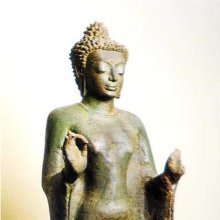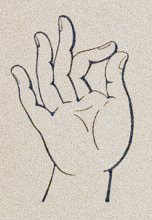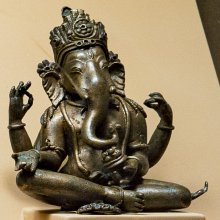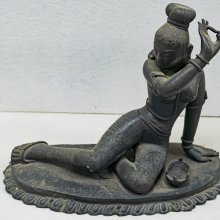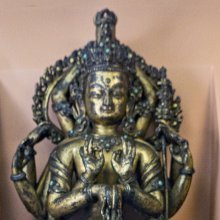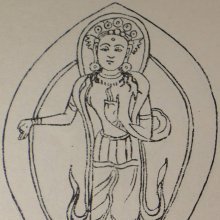Vitarka: 24 definitions
Introduction:
Vitarka means something in Buddhism, Pali, Hinduism, Sanskrit, Jainism, Prakrit, Marathi, Hindi. If you want to know the exact meaning, history, etymology or English translation of this term then check out the descriptions on this page. Add your comment or reference to a book if you want to contribute to this summary article.
Images (photo gallery)
(+2 more images available)
In Hinduism
Natyashastra (theatrics and dramaturgy)
Source: Wisdom Library: Nāṭya-śāstraVitarka (वितर्क, “supposition”) refers to ‘consequent supposition’ or hypotheses expressing doubt. Vitarka represents one of the thirteen garbhasandhi, according to the Nāṭyaśāstra chapter 21. This element is also known by the name Rūpa. Garbhasandhi refers to the “segments (sandhi) of the development part (garbha)” and represents one of the five segments of the plot (itivṛtta or vastu) of a dramatic composition (nāṭaka).
Source: archive.org: Natya ShastraVitarka (वितर्क, “deliberation”) is caused by determinants (vibhāva) such as doubt, cogitation, perplexity and the like. It is to be represented on the stage by consequents (anubhāva) such as various discussions, settling the definition, accepting the deliberation and the like.

Natyashastra (नाट्यशास्त्र, nāṭyaśāstra) refers to both the ancient Indian tradition (shastra) of performing arts, (natya—theatrics, drama, dance, music), as well as the name of a Sanskrit work dealing with these subjects. It also teaches the rules for composing Dramatic plays (nataka), construction and performance of Theater, and Poetic works (kavya).
Purana and Itihasa (epic history)
Source: archive.org: Puranic EncyclopediaVitarka (वितर्क).—A son of Dhṛtarāṣṭra of the Kuru dynasty, (Mahābhārata Ādi Parva, Chapter 94, Stanza 58).
Source: archive.org: Shiva Purana - English TranslationVitarka (वितर्क) refers to “doubt”, according to the Śivapurāṇa 2.5.18 (“The conversation between Nārada and Jalandhara”).—Accordingly, as Nārada said to Jalandhara: “[...] O lord of Daityas, I had been to the summit of Kailāsa casually. There I saw Śiva seated along with Pārvatī. He is fair-complexioned and exquisitely handsome. He has three eyes and the moon for his crest. On seeing this wonderfully great thing, a doubt (vitarka) arose in my mind. Can there be anywhere in the three worlds such a splendour as this? [...]”.
Source: JatLand: List of Mahabharata people and placesVitarka (वितर्क) is a name mentioned in the Mahābhārata (cf. I.89.51) and represents one of the many proper names used for people and places. Note: The Mahābhārata (mentioning Vitarka) is a Sanskrit epic poem consisting of 100,000 ślokas (metrical verses) and is over 2000 years old.

The Purana (पुराण, purāṇas) refers to Sanskrit literature preserving ancient India’s vast cultural history, including historical legends, religious ceremonies, various arts and sciences. The eighteen mahapuranas total over 400,000 shlokas (metrical couplets) and date to at least several centuries BCE.
Yoga (school of philosophy)
Source: ORA: Amanaska (king of all yogas): A Critical Edition and Annotated Translation by Jason BirchVitarka (वितर्क) refers to “(philosophical) speculations”, according to the Amanaska Yoga treatise dealing with meditation, absorption, yogic powers and liberation.—Accordingly, as Īśvara says to Vāmadeva: “[...] Some have intellects which have become insensitive through reasoning and [philosophical] speculations (vitarka), [and some] are elevated by [their] conceit and ego. Some are self-satisfied with pride, [rendered] stupid by [their obsession with] caste, and [some] are confounded by activities such as meditation. Generally speaking, the multitudes of people have deluded minds and various [mental] disturbances, for, those who experience nothing but the bliss of the undisturbed, natural [no-mind] state, are not seen in the world. [...]”.

Yoga is originally considered a branch of Hindu philosophy (astika), but both ancient and modern Yoga combine the physical, mental and spiritual. Yoga teaches various physical techniques also known as āsanas (postures), used for various purposes (eg., meditation, contemplation, relaxation).
Sports, Arts and Entertainment (wordly enjoyments)
Source: archive.org: Syainika Sastra of Rudradeva with English Translation (art)Vitarka (वितर्क) refers to “needless apprehension” (of recollections of the past), according to the Śyainika-śāstra: a Sanskrit treatise dealing with the divisions and benefits of Hunting and Hawking, written by Rājā Rudradeva (or Candradeva) in possibly the 13th century.—Accordingly, “Hunting on horseback (āśvina) represents one of the eight subdivisions of Hunting (mṛgayā). [...] But something should be said in brief about hunting, for the diffusion of its knowledge. [...] If unsuccessful the disappointment is great and it leads to needless apprehension (vitarka) of evil recollections of the past, a change of complexion and lamentation. These and other things happen therefore equally both in hunting and in the love of women Therefore hunting, too, is desirable for the attainment of the three objects of life. [...]”.

This section covers the skills and profiencies of the Kalas (“performing arts”) and Shastras (“sciences”) involving ancient Indian traditions of sports, games, arts, entertainment, love-making and other means of wordly enjoyments. Traditionally these topics were dealt with in Sanskrit treatises explaing the philosophy and the justification of enjoying the pleasures of the senses.
In Buddhism
Mahayana (major branch of Buddhism)
Source: Wisdom Library: Maha Prajnaparamita SastraVitarka (वितर्क, “examination”) refers to one of the five characteristics of the first dhyāna according to the 2nd century Mahāprajñāpāramitāśāstra (chapter XXVIII).—“are vitarka and vicāra one and the same thing or are they two different things? Answer.—They are two different things. Vitarka is the first moment of a coarse mind, vicāra is a more subtle (sūkṣma) analysis. Thus, when a bell is struck, the first sound is strong, the subsequent sound is weaker; this is vicāra”.
Also, “although the two things reside in the same mind, their characteristics re not simultaneous: at the moment of vitarka, the vicāra is blurred (apaṭu); at the moment of vicāra, the vitarka is blurred. Thus, when the sun rises, the shadows disappear. All the minds (citta) and all the mental events receive their name prorata with time: [vitarka and vicāra are distinct names of one single mind]”.

Mahayana (महायान, mahāyāna) is a major branch of Buddhism focusing on the path of a Bodhisattva (spiritual aspirants/ enlightened beings). Extant literature is vast and primarely composed in the Sanskrit language. There are many sūtras of which some of the earliest are the various Prajñāpāramitā sūtras.
Tibetan Buddhism (Vajrayana or tantric Buddhism)
Source: archive.org: The Indian Buddhist IconographyVitarka (वितर्क, “cogitation”) refers to one of the five classes of Dhyāna (meditation) which is one of six limbs of Yoga to be employed in Uttamasevā (excellent worship), according to the Guhyasamāja chapter 18.—[...] Dhyāna (meditation) is explained as the conception of the five desired objects through the five Dhyāni Buddhas, namely, Vairocana, Ratnasambhava, Amitābha, Amoghasiddhi and Akṣobhya. This Dhyāna is again subdivided into five kinds [viz., Vitarka (cogitation)].

Tibetan Buddhism includes schools such as Nyingma, Kadampa, Kagyu and Gelug. Their primary canon of literature is divided in two broad categories: The Kangyur, which consists of Buddha’s words, and the Tengyur, which includes commentaries from various sources. Esotericism and tantra techniques (vajrayāna) are collected indepently.
General definition (in Buddhism)
Source: Wisdom Library: Dharma-samgrahaVitarka (वितर्क, “thinking”) refers to one of the fourty “conditions” (saṃskāra) that are “associated with mind” (citta-samprayukta) as defined in the Dharma-saṃgraha (section 30). The Dharma-samgraha (Dharmasangraha) is an extensive glossary of Buddhist technical terms in Sanskrit (e.g., vitarka). The work is attributed to Nagarjuna who lived around the 2nd century A.D.
Vitarka also refers to one of the “twenty-four minor defilements” (upakleśa) as defined in the Dharma-saṃgraha (section 69).
In Jainism
General definition (in Jainism)
Source: Encyclopedia of Jainism: Tattvartha Sutra 9: Influx of karmas1) Vitarka (वितर्क).—Scriptural knowledge is called vitarka i.e. knowledge which is free from contradictions /doubts/ arguments.
2) Vitarka (वितर्क, “scriptural knowledge”).—One of the seven sub categories of ascetics (nirgrantha-muni);—What are the peculiarities amongst different kind of ascetics with reference to ‘scriptural knowledge’ (vitarka)? The husk (pulāka), the tainted (bakuśa), and pratisevana-kuśīla ascetics have knowledge of ten pūrvas maximum. The kaṣāya-kuśīla and unbound (nirgrantha) ascetics can have knowledge of all 14 pūrvas.
At the minimum level the knowledge of husk (pulāka) ascetic can be of the first limb of inner corpus of Jains, namely: Ācārāṃga, while those of the spotted (bakuśa) and pratisevana-kuśīla ascetics the minimum knowledge and practice of the five attitude of self-control (samitis) and three attitudes of restraint (guptis) called collectively eightfold alphabet of scriptures (mātrakāpada) is essential.

Jainism is an Indian religion of Dharma whose doctrine revolves around harmlessness (ahimsa) towards every living being. The two major branches (Digambara and Svetambara) of Jainism stimulate self-control (or, shramana, ‘self-reliance’) and spiritual development through a path of peace for the soul to progess to the ultimate goal.
Languages of India and abroad
Marathi-English dictionary
Source: DDSA: The Molesworth Marathi and English Dictionaryvitarka (वितर्क).—m (S) A thought, a reasoning, a conjecture, a fancy, conceit, scheme, device, speculation. In this sense the use is generally plural, and the implication is of Deviousness, wildness, airiness, flightiness. 2 S Reasoning or considering widely and largely; contemplating the bearings, the alternatives, the contingencies, the possible issues.
Source: DDSA: The Aryabhusan school dictionary, Marathi-Englishvitarka (वितर्क).—m A thought, a reasoning.
Marathi is an Indo-European language having over 70 million native speakers people in (predominantly) Maharashtra India. Marathi, like many other Indo-Aryan languages, evolved from early forms of Prakrit, which itself is a subset of Sanskrit, one of the most ancient languages of the world.
Sanskrit dictionary
Source: DDSA: The practical Sanskrit-English dictionaryVitarka (वितर्क).—
1) Argument, reasoning, inference.
2) Guess, conjecture, supposition, belief; शिरीषपुष्पाधिकसौकुमार्यौ बाहू तदीयाविति मे वितर्कः (śirīṣapuṣpādhikasaukumāryau bāhū tadīyāviti me vitarkaḥ) Kumārasambhava 1.41.
3) Fancy, thought; राग- ग्राहवती वितर्कविहगा (rāga- grāhavatī vitarkavihagā) Bhartṛhari 3.45.
4) Doubt; नुनोद तस्य स्थल- पद्मिनीगतं वितर्कम् (nunoda tasya sthala- padminīgataṃ vitarkam) Kirātārjunīya 4.5;13.2.
5) Deliberation, discussion.
6) A teacher in divine knowledge.
7) False or adverse conjecture; वितर्कं निश्चयाज्जयेत् (vitarkaṃ niścayājjayet) Mahābhārata (Bombay) 12.274.11.
8) Purpose, intention.
Derivable forms: vitarkaḥ (वितर्कः).
Source: Cologne Digital Sanskrit Dictionaries: Shabda-Sagara Sanskrit-English DictionaryVitarka (वितर्क).—m.
(-rkaḥ) 1. Reasoning, discussion. 2. Doubt, deliberation. 3. A teacher, an instructor in divine knowledge. 4. Consideration of probabilities, mental anticipation of alternatives, conjecture. E. vi implying discrimination, &c., tark to reason, aff. ac .
Source: Cologne Digital Sanskrit Dictionaries: Benfey Sanskrit-English DictionaryVitarka (वितर्क).—[vi-tark + a], m. 1. Deliberation, [Pañcatantra] i. [distich] 226. 2. Consideration. [Hitopadeśa] iv. [distich] 96. 3. Opinion, [Johnson's Selections from the Mahābhārata.] 55, 143; conjecture, [Mālatīmādhava, (ed. Calc.)] 20, 3. 4. Discussion, [Prabodhacandrodaya, (ed. Brockhaus.)] 116, 9. 5. Doubt, [Lassen, Anthologia Sanskritica.] 2. ed. 21, 1. 6. A teacher in divine knowledge.
Source: Cologne Digital Sanskrit Dictionaries: Cappeller Sanskrit-English DictionaryVitarka (वितर्क).—[masculine] conjecture, supposition, deliberation, doubt.
Source: Cologne Digital Sanskrit Dictionaries: Monier-Williams Sanskrit-English Dictionary1) Vitarka (वितर्क):—[=vi-tarka] [from vi-tark] m. conjecture, supposition, guess, fancy, imagination, opinion, [Mahābhārata; Kāvya literature] etc.
2) [v.s. ...] doubt, uncertainty, [Yoga-sūtra; Sarvadarśana-saṃgraha]
3) [v.s. ...] a dubious or questionable matter, [Yoga-sūtra]
4) [v.s. ...] reasoning, deliberation, consideration, [Kāvya literature; Sāhitya-darpaṇa]
5) [v.s. ...] purpose, intention, [Jātakamālā]
6) [v.s. ...] a teacher, instructor in divine knowledge, [Horace H. Wilson]
7) [v.s. ...] a [particular] class of Yogīs, [Jātakamālā]
8) [v.s. ...] Name of a son of Dhṛta-rāṣṭra, [Mahābhārata]
9) [v.s. ...] [plural] Name of the five principal sins, [Jātakamālā]
Source: Cologne Digital Sanskrit Dictionaries: Yates Sanskrit-English DictionaryVitarka (वितर्क):—[vi-tarka] (rkaḥ) 1. m. Reasoning; doubt; conjecture; a teacher.
Source: DDSA: Paia-sadda-mahannavo; a comprehensive Prakrit Hindi dictionary (S)Vitarka (वितर्क) in the Sanskrit language is related to the Prakrit word: Viakka.
[Sanskrit to German]
Sanskrit, also spelled संस्कृतम् (saṃskṛtam), is an ancient language of India commonly seen as the grandmother of the Indo-European language family (even English!). Closely allied with Prakrit and Pali, Sanskrit is more exhaustive in both grammar and terms and has the most extensive collection of literature in the world, greatly surpassing its sister-languages Greek and Latin.
Hindi dictionary
Source: DDSA: A practical Hindi-English dictionaryVitarka (वितर्क) [Also spelled vitark]:—(nm) discussion, reasoning; ~[rkita] discussed; thought over, reasoned; ~[rkya] to be or worth being discussed/reasoned.
...
Kannada-English dictionary
Source: Alar: Kannada-English corpusVitarka (ವಿತರ್ಕ):—
1) [noun] a statement, reason or fact for or against a point putforth during a discussion; an argument.
2) [noun] a conjecture; a supposition; a guess.
3) [noun] a doubt; uncertainty.
4) [noun] (rhet.) the act of analysing the favourable and unfavourable points, pros and cons, etc. of a proposition.
5) [noun] (budh.) sincere application of the mind in considering or deliberating something.
Kannada is a Dravidian language (as opposed to the Indo-European language family) mainly spoken in the southwestern region of India.
See also (Relevant definitions)
Starts with: Vitarka Mudra, Vitarkana, Vitarkanem, Vitarkapadavi, Vitarkavant, Vitarkavat, Vitarkonmulana.
Ends with: Akaraparivitarka, Avitarka, Cetahparivitarka, Durvitarka, Kamavitarka, Nirvitarka, Parivitarka, Savitarka, Tarkavitarka, Upavitarka.
Full-text (+43): Viakka, Vitarkapadavi, Savitarkam, Nirvitarka, Durvitarka, Vitark, Vitarkavat, Vicara, Vitarkana, Saukumarya, Avitarka, Vyabhicaribhava, Avitarkita, Vitarkavant, Parivitarka, Savitarka, Vitarkkam, Vitarkanem, Bahibhashya, Tarka.
Relevant text
Search found 35 books and stories containing Vitarka, Vi-tarka; (plurals include: Vitarkas, tarkas). You can also click to the full overview containing English textual excerpts. Below are direct links for the most relevant articles:
Bhakti-rasamrta-sindhu (by Śrīla Rūpa Gosvāmī)
Verse 2.4.132 < [Part 4 - Transient Ecstatic Disturbances (vyābhicāri-bhāva)]
Verse 2.4.204 < [Part 4 - Transient Ecstatic Disturbances (vyābhicāri-bhāva)]
Verse 2.4.6 < [Part 4 - Transient Ecstatic Disturbances (vyābhicāri-bhāva)]
Maha Prajnaparamita Sastra (by Gelongma Karma Migme Chödrön)
I. The three concentrations (samādhi) according to the Abhidharma < [Part 2 - The three meditative stabilizations]
2. First dhyāna < [Part 3 - Definition of the various dhyānas and samāpattis]
3. Second dhyāna < [Part 3 - Definition of the various dhyānas and samāpattis]
Tattvartha Sutra (with commentary) (by Vijay K. Jain)
Verse 9.43 - Vitarka is scriptural knowledge < [Chapter 9 - Stoppage and Shedding of Karmas]
Verse 9.41 - Definition of Pṛthaktvavitarka and Ekatvavitarka < [Chapter 9 - Stoppage and Shedding of Karmas]
Verse 9.42 - Ekatvavitarka is free from shifting (vīcāra) < [Chapter 9 - Stoppage and Shedding of Karmas]
Jainism and Patanjali Yoga (Comparative Study) (by Deepak bagadia)
Part 4.9 - Samadhi and Samapattis < [Chapter 2 - Yoga philosophy and practices]
Part 4.4 - Yogic techniques for control of Vrttis (2): Astangayoga < [Chapter 2 - Yoga philosophy and practices]
Part 4.10 - Samyama and its effects (parinama) < [Chapter 2 - Yoga philosophy and practices]
Yoga-sutras (Ancient and Modern Interpretations) (by Makarand Gopal Newalkar)
Sūtra 1.17 [Samprajñāta and Asamprajñāta] < [Book I - Samādhi-pāda]
Sūtra 1.22 < [Book I - Samādhi-pāda]
Sūtra 3.1 [Dhāraṇā—concentration] < [Book III - Vibhūti-pāda]
Sahitya-kaumudi by Baladeva Vidyabhushana (by Gaurapada Dāsa)
Text 7.130 < [Chapter 7 - Literary Faults]
Text 4.56 < [Chapter 4 - First-rate Poetry]
Text 4.25 < [Chapter 4 - First-rate Poetry]
Related products
